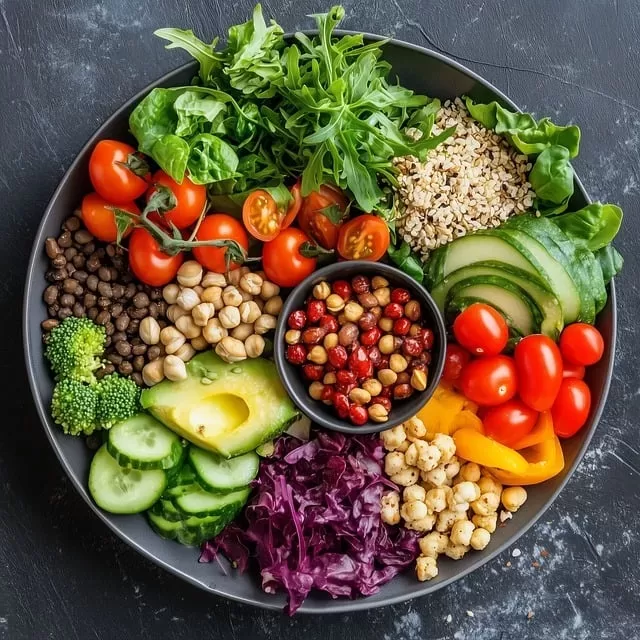Are you a health-conscious foodie looking for the perfect balance between a paleo and vegan diet? Dive into the fascinating world of paleo and vegan statistics in the US and UK.
Paleo and Vegan diets are gaining popularity in the USA and UK due to a growing emphasis on health, sustainability, and ethical concerns. These diets offer distinct approaches to nutrition, with the Paleo diet focusing on whole, unprocessed foods and the Vegan diet eliminating all animal products. This trend reflects a desire for healthier lifestyles and a more conscious consumption of food.
Whether you’re intrigued by the ancestral wisdom of the Paleo diet or the ethical and environmental implications of the Vegan diet, this article will delve into the details of both approaches. We’ll explore their potential benefits, challenges, and the science behind them. So, if you’re curious about these trending diets and want to make informed decisions about your own eating habits, keep reading!

What are the paleo and vegan diets?
The Paleo and Vegan diets have been gaining significant attention in recent years, with a growing number of people adopting these dietary approaches. Statista reports that the global vegan food market has reached a value of $24.6 billion and is expected to grow further in 2024. This indicates a significant increase in the adoption of vegan diets worldwide. This suggests a rising interest in exploring alternative dietary options.
Both the Paleo and Vegan diets are based on specific principles and guidelines. Here’s a brief overview of each:
Paleo vs. Vegan Diet
| Paleo Diet | Vegan Diet |
| Inspired by the presumed dietary habits of our Paleolithic ancestors. | Eliminates all animal products, including meat, dairy, and eggs. |
| Emphasizes whole, unprocessed foods like lean meats, fish, fruits, vegetables, nuts, and seeds. | Focuses on plant-based foods such as fruits, vegetables, grains, legumes, nuts, and seeds. |
| Avoids grains, legumes, dairy products, refined sugars, and processed oils. | Offers various nutritional benefits and aligns with ethical and environmental concerns. |
Understanding the key principles of these diets from a cookbook can help you determine if they are suitable for your individual needs and preferences.
Growth of paleo and veganism in the USA and UK
The Paleo and Vegan diets have experienced a significant surge in popularity in recent years, especially in the USA and UK. Paleo Foundation forecasts that the global ketogenic diet food market, which includes paleo diet foods, is expected to reach $12.35 billion by 2024. This trend has been fueled by various factors, including health concerns, environmental awareness, and ethical considerations.
Key Factors Driving Growth:
- Health Benefits: Both diets are associated with numerous health benefits, including weight loss, improved heart health, and reduced risk of chronic diseases. TIME magazine published a study comparing various diets, including vegan and paleo, based on environmental impact and nutritional quality. This study provides insights into the health and environmental benefits of these diets.
- Environmental Concerns: Worldmetrics.org highlights that veganism can reduce greenhouse gas emissions by up to 70% and that over 9.7 million Americans now follow a vegan diet. This report also notes a 600% increase in Americans identifying as vegan over the last decade.
- Ethical Considerations: Ethical concerns about animal welfare have also contributed to the rise of veganism.
- Social Influence: The increasing visibility of vegan and Paleo celebrities and influencers has helped to normalize these dietary choices.
- Accessibility: The growing availability of vegan and Paleo-friendly products in supermarkets and restaurants has made it easier for people to follow these diets. Strategic Market Research states that 70% of all US citizens eat plant-based foods, up from 66% in 20223. This shows a growing trend towards plant-based diets, including veganism.
Comparative analysis: USA vs. UK
While both the USA and UK have seen a significant rise in the popularity of Paleo and Vegan diets, there are notable differences in the prevalence and acceptance of these dietary choices between the two countries.
Prevalence
The UK has generally seen a higher adoption rate of plant-based diets, including veganism and vegetarianism, compared to the USA. This can be attributed to factors such as cultural influences, environmental concerns, and a stronger emphasis on animal welfare in the UK.
Finder.com reports that the number of vegans in the UK has increased significantly, with an estimated 2.5 million people (4.7% of the population) following a vegan diet in 2024. This is up from 1.4 million (2.5%) in 2023.
Social Acceptance
Veganism and vegetarianism tend to be more socially accepted in the UK, with a wider range of plant-based options available in restaurants and supermarkets.
Statista highlights that the UK market for meat substitutes is now worth over one billion euros, making it the largest in Europe. This reflects the growing interest in vegan and vegetarian diets.
In the USA, while these diets have gained popularity, there may still be some stigma or misconceptions associated with them. You can also learn from the best vegan cookbooks plant-based in the US.
Government Support
The UK government has been more proactive in promoting plant-based diets, with initiatives such as the Veganuary campaign and government-funded research into plant-based alternatives.
A report by The Vegan Society indicates that 32% of Brits believe the government should promote vegan diets to tackle the climate crisis. This aligns with the UK government’s broader climate goals, such as achieving net zero emissions by 2050.
In the USA, while there has been increased attention to plant-based diets, government support has been less prominent but they can also have vegan-friendly restaurants in major U.S. cities.
Cultural Factors
Cultural differences between the USA and UK can also influence dietary choices. For example, the UK has a stronger tradition of vegetarianism, dating back to the 19th century, while the USA has a more meat-centric culture.
Retail Times also notes the impressive growth in the vegan population in the UK, with an increase of 1.1 million vegans in just one year.
Impact on the Food Industry
The growing popularity of Paleo and Vegan diets has had a significant impact on the food industry, driving innovation and product development. A study by Mintel found that the global market for plant-based foods and beverages is expected to reach $23.4 billion by 2025, indicating a substantial increase in demand.
Key Impacts:
- Product Innovation: Food manufacturers have responded to the rising popularity of these diets by introducing a wider range of plant-based and Paleo-friendly products, including meat alternatives, dairy alternatives, grain-free snacks, and cookbooks.
- Market Expansion: The demand for Paleo and Vegan products has led to the creation of new market segments and opportunities for food businesses.
- Supply Chain Changes: The increased demand for plant-based ingredients has put pressure on agricultural supply chains, leading to changes in production methods and land use.
- Ethical Considerations: The growing popularity of these diets has raised ethical concerns about animal welfare and environmental sustainability, prompting food businesses to adopt more ethical practices.
- Consumer Education: The food industry has played a role in educating consumers about the benefits and challenges of these diets, helping to drive demand and promote healthy eating habits. You can also learn from cookbooks.
FAQs
What percentage of the UK are vegan?
According to recent estimates, around 3.5% of the UK population identifies as vegan. This number has been steadily increasing in recent years, reflecting a growing interest in plant-based diets.
What is paleo diet UK?
The Paleo diet UK follows the principles of the ancestral diet, emphasizing whole, unprocessed foods like lean meats, fish, fruits, vegetables, nuts, and seeds. It avoids grains, legumes, dairy products, refined sugars, and processed oils.
How much of the USA is vegan?
Estimates suggest that approximately 5% of the US population is vegan. Similar to the UK, the number of vegans in the US has been on the rise, driven by various factors such as health concerns and ethical considerations.
Is the UK vegan friendly?
The UK has seen a significant increase in vegan-friendly options in recent years. Many restaurants, cafes, and supermarkets now offer a wide range of plant-based alternatives, making it easier for vegans to find suitable food choices.
For those interested in exploring these options further, we recommend checking out our related articles on Paleo and Vegan nutrition, recipes, and health benefits.






